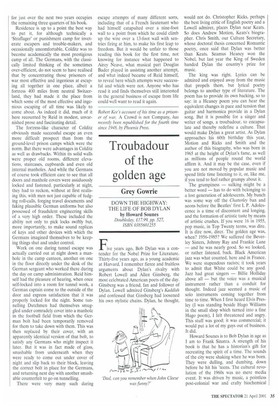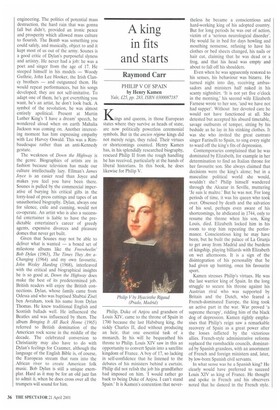Troubadour of the golden age
Grey Gowrie
DOWN THE HIGHWAY: THE LIFE OF BOB DYLAN by Howard Sounes
Doubleday, £17.99, pp. 527, ISBN 0385601255
Five years ago, Bob Dylan was a contender for the Nobel Prize for Literature. Thirty-five years ago, as a young academic at Harvard, I remember fierce and fruitless arguments about Dylan's rivalry with Robert Lowell and Allen Ginsberg, the most celebrated American poets of the day. Ginsberg was a friend, fan and follower of Dylan. Lowell admired Ginsberg's Kaddish and confessed that Ginsberg had loosened his own stylistic chains. Dylan, he thought.
would not do. Christopher Ricks, perhaps the best living critic of English poetry and a Lowell admirer, places Dylan near Keats. So does Andrew Motion, Keats's biographer. Chris Smith. our Culture Secretary, whose doctoral thesis concerned Romantic poetry, once said that Dylan was better than Keats. Seamus Heaney won the Nobel, but last year the King of Sweden handed Dylan the country's prize for music.
The king was right. Lyrics can be admired and enjoyed away from the music that propels them, but lyrical poetry belongs to another type of literature. The poem has to provide its own backing, so to say: in a Heaney poem you can hear the equivalent changes in pace and tension that guitar and harmonica provide in a Dylan song. But it is possible for a singer and writer of songs, a troubadour, to encapsulate and thereby redefine a culture. That would make Dylan a great artist. As Dylan approaches his 60th birthday this year, Motion and Ricks and Smith and the author of this biography, who was born in 1965 at the height of Dylan's fame, as well as millions of people round the world affirm it. And it may be the case, even if you are not moved by popular music and spend little time listening to it, or, like me, if you tend to feel rather grumpy about it.
The grumpiness — sulking might be a better word — has to do with belonging to a lost generation of adolescents. My bunch was some way off the Chatterley ban and aeons before the Beatles' first L P. Adolescence is a time of discontent and longing, and the formation of artistic taste by means of artistic crushes. If you were 16 in 1955, pop music, in Top Twenty terms, was dire. It is dire now, direr. The golden age was, when? 1956-1985? We suffered the Beverley Sisters, Johnny Ray and Frankie Lane — and he was nearly good. So we looked, or rather listened. back. Black American jazz was what counted, here and in France. We were stupendous racists; it took years to admit that White could be any good. Jazz had great singers — Billie Holliday above all — but the voice was a musical instrument rather than a conduit for thought. Indeed jazz seemed a music of solo instruments coming together from time to time. When I first heard Elvis Presley (I was standing beside Hugo Williams in the small shop which turned into a fine Hugo poem), I felt threatened and angry. This stuff was good; it was commercial; it would put a lot of my guys out of business. It did.
Howard Sounes is to Bob Dylan in age as I am to Frank Sinatra. A strength of his book is that he has a historian's gift for recreating the spirit of a time. The sounds of the city were shaking when he was born. They were dulling, and dumbing, down before he hit his 'teens. The cultural revolution of the 1960s was no mere media event. It was driven by music, a pointless post-colonial war and crafty biochemical engineering. The politics of potential mass destruction, the hard rain that was gonna fall but didn't, provided an ironic peace and prosperity which allowed mass culture to flourish. The Bomb was something you could safely, and musically, object to and it kept most of us out of the army. Sounes is a good critic of Dylan's purposeful slyness and artistry. He never had a job: he was a poet and singer from the age of 17. He steeped himself in his models — Woody Guthrie, John Lee Hooker, the Irish Clancy brothers — and outgunned them. He would repeat performances, but his songs developed; they are not self-imitative. To adapt one of them, he's got everything you want, he's an artist, he don't look back. A symbol of the revolution, he was almost entirely apolitical. Present at Martin Luther King's 'I have a dream' speech, he wondered aloud when on earth Mahalia Jackson was coming on. Another interesting moment has him expressing empathy with Lee Harvey Oswald. This was a Rimbaudesque rather than an anti-Kennedy gesture.
The weakness of Down the Highway is the genre. Biographies of artists are in fashion because television has made our culture intellectually lazy. Ellman's James Joyce is an easier read than Joyce and makes you feel you have been there. Sounes is pulled by the commercial imperative of burying his critical gifts in the lorry-load of press cuttings and tapes of an unauthorised biography. Dylan, always one for silence, exile and cunning, would not co-operate. An artist who is also a successful entertainer is liable to have the predictable entertainer's career of greedy agents, expensive divorces and pleasure domes that never get built.
Given that Sounes may not be able to deliver what is wanted — a boxed set of milestone albums like the Freewheelin' Bob Dylan (1963), The Times They Are aChanging (1964) and my own favourite, John Wesley Harding (1968), interleaved with the critical and biographical insights he is so good at, Down the Highway does make the best of its predetermined job. British readers will enjoy the British connections. Dylan, whose family came from Odessa and who was baptised Shabtai Zisel ben Avraham, took his name from Dylan Thomas. He knew traditional English and Scottish ballads well. He influenced the Beatles and was influenced by them. The album Bringing It All Back Home (1965) referred to British domination of the American rock scene in the middle of the decade. The celebrated conversion to Christianity may also have to do with Dylan's feelings for Cranmer, although the language of the English Bible is, of course, the European stream that runs into the African river to create American folk music. Bob Dylan is still a unique exemplar. Hard as it may be for an old jazz fan to admit it, when he does cross over all the trumpets will sound for him,



































































 Previous page
Previous page